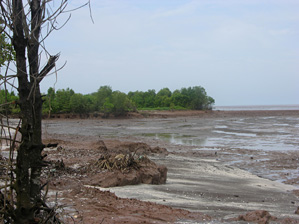Activity page

Share
External Related Links
Documentary on Rwanda's efforts to plan for climate change (John Liu, hosted on Youtube)
CIFOR Blog: Adaptation research needed to fill gaps
Attachments
Uso de los bosques para aumentar la capacidad de adaptación al cambio climático _0.pdf
PROFOR_Brief_HondurasLow_0.pdf
PROFOR_WrkingPaper_Honduras_0.pdf
PROFOR_Brief_Honduras_ESP (00000003)_0.pdf
Country case study - Burkina Faso_0.pdf
Keywords
Authors/Partners
CIFOR, Trust Fund for Environmentally and Socially Sustainable Development, PROFOR
How Forests Enhance Resilience to Climate Change
CHALLENGE
Developing countries are expected to suffer the most from changes in climatic patterns. The effects of climate change, including higher temperatures, changes in precipitation patterns, rising sea levels and increased frequency of weather related disasters are bound to create risks for agriculture, food, and water supplies. International and national discussions on forests and climate change have largely been focused on reducing emissions from deforestation and degradation and enhancing carbon stocks (REDD+).
Less obvious, yet equally important, is the role of forests in enhancing landscape resilience to climate change—for example at the scale of a watershed. Forests and trees provide environmental services ranging from increasing water quality and quantity in well defined areas, reducing soil erosion, creating micro-climatic conditions that maintain (or in some cases improve) productivity. The sustainable management of forests can also strengthen social resilience, by offering a diversification of revenue sources and product supplies, and building the capacity of local and national institutions.
Forest and tree management could provide a low-cost approach to enhancing resilience of local landscapes to climate change but needs to balance production, livelihood, adaptation and mitigation goals.
PROFOR is conducting a study to improve our understanding of the role of forests in improving the climate resilience of other sectors (mainly agriculture, water, social and biomass based energy sectors). The goal is to inform national adaptation strategies so that they explicitly reflect the value of forest and allocate appropriate resources to facilitate the use of forests for adaptation.
This study will:
• Map forest management approaches and their cross-sectoral impacts
• Identify interactions between forest sector adaptation (or existing management) and resilience enhancement in other sectors (mainly water, biomass-based energy, and agriculture)
• Assess the institutional and financial requirements to identify and implement tree/forest-based adaptation measures
• Identify ways of supporting local knowledge and science that promote tree/forest based adaptation measures with multi-sectoral benefits
RESULTS
The state of knowledge report, synthesis report and case studies are now complete. Briefs for each case study will be available for download soon (the Honduras case study is already available at left in English and Spanish.
For stories and updates on related activities, follow us on twitter and facebook , or subscribe to our mailing list for regular updates.
Author : CIFOR, Trust Fund for Environmentally and Socially Sustainable Development, PROFOR
Last Updated : 06-15-2024
Assessing Forest Governance in Burkina Faso
CHALLENGE
Burkina Faso is a Sahelian savannah country which has experienced continued degradation of its natural resources including forests. Poor governance is seen as an important contributing factor to this degradation. Burkina Faso is also one of eight pilot countries selected by the Forest Investment Program (FIP) for investments that would address the underlying causes for deforestation and improve forest carbon sequestration. This program could result in significant investment activities totaling USD 30-35 million, however poor forest governance, corruption and lack of transparency could be a serious bottleneck to the implementation of the FIP. An early identification of the risks posed by weak governance could ecourage steps toward policy reforms, strengthening implementation capacity.
APPROACH
This PROFOR-financed activity aimed to apply a forest governance diagnostic tool to construct a baseline assessment of the forest governance situation in Burkina Faso and to pinpoint the areas requiring highest priority reforms. A forest governance reform strategy for the country would then be formulated on the basis of this assessment.
A second objective of this work was to support the production of a field manual to facilitate the application of forest governance diagnostics in any country interested in improving the quality of forest governance. The field manual would draw upon the lessons learned from the application of the diagnostics in Uganda (through a separate PROFOR activity) and in Burkina, as well as applications of the governance assessment framework by other agencies (for example, in Kenya by Indufor and in Russia by the Federal Forest Agency, with support from the World Bank and DFID).
RESULTS
- A background country assessment report, finalized in February 2011 (“Rapport de base sur la Gouvernance Forestière au Burkina Faso,” in French).
- A customized questionnaire (in French), finalized in October 2011.
- A multistakeholder workshop was held on October 12, 2011. The workshop report ("The Quality of Forest Governance in Burkina Faso: A first analysis of strengths and weaknesses") is available in a bilingual French and English file on this page.
- A User's Guide for a Forest Governance Diagnostic Tool was also produced to guide other countries in assessing and monitoring forest governance.
For stories and updates on related activities, follow us on twitter and facebook , or subscribe to our mailing list for regular updates.
Last Updated : 06-15-2024








